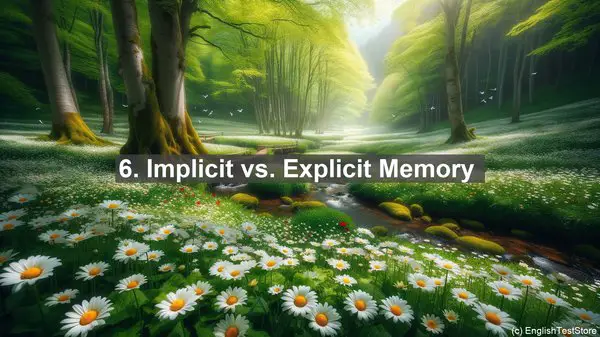Introduction
Welcome to this educational lesson. Today, we’ll be diving into the fascinating world of cognitive psychology. But before we begin, it’s essential to clarify some commonly confused words that often arise in this field. So, let’s get started!
1. Encoding vs. Decoding
The first pair of words that often cause confusion is ‘encoding’ and ‘decoding.’ While ‘encoding’ refers to the process of transforming information into a format that can be stored in memory, ‘decoding’ involves retrieving and interpreting that information.
2. Short-term Memory vs. Working Memory
Next up, we have ‘short-term memory’ and ‘working memory.’ Although they are related, they have distinct functions. ‘Short-term memory’ is like a temporary storage space, holding information for a brief period. On the other hand, ‘working memory’ not only stores but also actively processes and manipulates that information.
3. Recall vs. Recognition
Moving on, ‘recall’ and ‘recognition’ are often used interchangeably, but they have different meanings. ‘Recall’ involves retrieving information from memory without any cues, while ‘recognition’ is the ability to identify or acknowledge previously encountered information when it is presented again.
4. Retroactive vs. Proactive Interference
Now, let’s clarify the difference between ‘retroactive’ and ‘proactive’ interference. ‘Retroactive interference’ occurs when newly learned information disrupts the recall of previously learned information. Conversely, ‘proactive interference’ happens when previously learned information interferes with the recall of newly learned information.
5. Episodic vs. Semantic Memory
When it comes to memory, ‘episodic’ and ‘semantic’ memory are two distinct types. ‘Episodic memory’ refers to the memory of specific events or experiences, while ‘semantic memory’ involves general knowledge and concepts.
6. Implicit vs. Explicit Memory
Another important memory-related pair is ‘implicit’ and ‘explicit’ memory. ‘Implicit memory’ is unconscious and automatic, influencing our behavior without our awareness. On the other hand, ‘explicit memory’ is conscious and deliberate, requiring intentional retrieval.
7. Heuristics vs. Algorithms
In problem-solving, ‘heuristics’ and ‘algorithms’ are two approaches. ‘Heuristics’ are mental shortcuts or rules of thumb that help us make quick decisions, while ‘algorithms’ are step-by-step procedures that guarantee a correct solution but may be time-consuming.

8. Confirmation Bias vs. Availability Heuristic
Let’s discuss two common cognitive biases. ‘Confirmation bias’ is the tendency to seek or interpret information in a way that confirms our preexisting beliefs. On the other hand, the ‘availability heuristic’ is when we rely on immediate examples or instances that come to mind when making judgments or decisions.
9. Serial Position Effect
The ‘serial position effect’ refers to the tendency to remember items at the beginning (primacy effect) and end (recency effect) of a list more effectively than those in the middle.
10. Nature vs. Nurture
Lastly, the age-old debate of ‘nature’ versus ‘nurture.’ ‘Nature’ refers to our innate, genetic factors that influence behavior and cognition, while ‘nurture’ encompasses the environmental and experiential influences.

